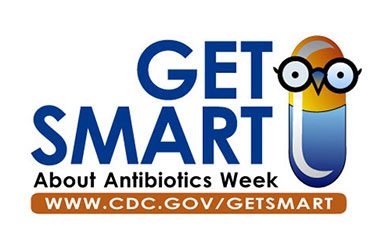Stop the threat of antibiotic resistance

AMR leads to higher medical costs, prolonged hospital stays and increased mortality. The CDC estimates at least 2 million illnesses and 23,000 deaths are caused annually by antibiotic-resistant bacteria in the United States alone with overall associated healthcare costs in excess of $20 billion. Worldwide, there are approximately 700,000 AMR-related deaths each year, and it is estimated that by the year 2050, that number could reach 10 million deaths annually at a cost of 100 trillion dollars.
Several countries throughout the world are observing the week of 13-19 November 2017 as “Antibiotic Awareness Week” to raise awareness of the threat of antibiotic resistance and the importance of appropriate antibiotic prescribing and use. One major theme is to seek advice from a qualified health care professional before taking antibiotics. While antibiotic resistance occurs naturally, the misuse or overuse of antibiotics in humans and animals has been confirmed to accelerate this process. Antibiotics need to be used appropriately. Everyone (doctors, hospitals, the general public) can do their part to minimize the development of antibiotic resistance.

How can you protect yourself and your family from antibiotic resistant infections? The CDC suggests a number of proven yet simple strategies to prevent the spread of resistance.
Wash Your Hands. Washing your hands is the best way to remove germs, avoid getting sick, and prevent the spread of germs to others.
Get Vaccinated. There are a number of vaccines available to control the spread of infectious diseases that were once common around the world (e.g., diphtheria, pertussis, measles, mumps, rubella). Because the majority of the population gets vaccinated, outbreaks of such diseases rarely occur now, and those usually affected most likely were not fully vaccinated (either with no vaccine or an incomplete series).
Take Antibiotics Only When Necessary. Most colds, flu, sore throats, and bronchitis are caused by viruses which do not respond to antibiotic therapy. In the US, it’s estimated that a third of all prescriptions are unnecessary. Don’t demand antibiotics if your doctor says you don’t need them. Often, using over the counter medications for symptom relief might be the best treatment option.
Use Antibiotics the Right Way. Follow the directions given by your doctor. While it is tempting to stop taking an antibiotic when you start feeling better, this actually increases the chances of developing resistance, so it is important to complete the full course as prescribed. Never share or use leftover antibiotics. They may not be the correct antibiotic and would not be a full course of treatment.
Take the antibiotics quiz: https://www.cdc.gov/antibiotic-use/community/about/quiz.html
Do you want to learn more? https://www.cdc.gov/antibiotic-use/week/index.html



